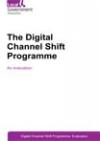This report presents an evaluation of the Local Government Association (LGA)’s Digital Channel Shift Programme. It summarises the outcomes (financial and non-financial) achieved by the programme, the key messages and lessons learnt, and recommendations for the design of future programmes of support.
The LGA set up the Digital Channel Shift Programme to support councils’ use of digital technology and promote the greater use of online tools for the benefit of their residents, local businesses and staff.
More than 60 councils applied and 23 were awarded grant funding. The successful projects came from unitary, county and district councils and included a range of services – taxi licenses, cemeteries, archives, special educational needs and disabilities (SEND) and highways – as well as introducing innovative technologies such as harnessing ‘bot’ technology.
As well as financial support the LGA also mentored the project managers throughout the programme. They ran a series of workshops to share learning, provided best practice and learning from previous programmes, helped councils with supplier management issues and linked up similar projects to share learning as the programme progressed.
Projects included:
- online licensing portals for taxi drivers to apply for licences
- SMS text messaging services for council tax payments and household waste recycling
- expanding council tax, revenues and benefits services online to provide self-service for customers 24/7
- a ‘digital first’ self-service tool for funeral directors to book funerals at cemeteries and crematoria
- online citizen self-service for reporting waste collection errors and ordering documents from archives.
Financially, a total of more than £1.69 million in efficiency savings and increased income was generated during their first year of operation – delivering an average return of £5.64 on every £1 of grant funding.

- Published by:
-
LGA
- Reference code:
